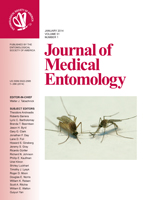Climatic changes forecasted in the coming years are likely to result in substantial alterations to the distributions and populations of vectors of arthropod-borne pathogens. Characterization of the effect of temperature shifts on the life history traits of specific vectors is needed to more accurately define how such changes could impact the epidemiological patterns of vector-borne disease. Here, we determined the effect of temperatures including 16, 20, 24, 28, and 32°C on development time, immature survival, adult survival, mosquito size, blood feeding, and fecundity of both field and colonized populations of the Culex mosquitoes Culex pipiens L., Culex quinquefasciatus Say, and Culex restuans Theobald. Our results demonstrate that temperature significantly affects all of these traits, yet also that the extent of this effect is at times incongruent among temperatures, as well as being population and species-specific. Comparisons of colonized mosquitoes with field populations generally demonstrate decreased adult and immature survival, increased blood feeding and egg production, and significant variation in the effects of temperature, indicating that such colonies are not fully representative of natural populations. Results with field populations in general indicate that increases in temperature are likely to accelerate mosquito development, and that this effect is greater at temperatures below 24°C, but also that temperature significantly increases mortality. Among field populations, Cx. restuans were most affected by temperature increases, with decreased longevity relative to other species and significant increases in adult and immature mortality measured with each incremental temperature increase. Despite the unique climates characteristic of the geographic ranges of Cx. quinquefasciatus and Cx. pipiens, evidence of significant species-specific adaptation to temperature ranges was not seen. Taken together, these results indicate that geographic region, as well as species and population differences, must be considered when measuring the effect of temperature on vector populations.
How to translate text using browser tools
1 January 2014
The Effect of Temperature on Life History Traits of Culex Mosquitoes
Alexander T. Ciota,
Amy C. Matacchiero,
A. Marm Kilpatrick,
Laura D. Kramer
ACCESS THE FULL ARTICLE
It is not available for individual sale.
This article is only available to subscribers.
It is not available for individual sale.
It is not available for individual sale.

Journal of Medical Entomology
Vol. 51 • No. 1
January 2014
Vol. 51 • No. 1
January 2014
Culex
life history traits
temperature




